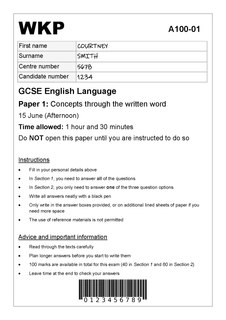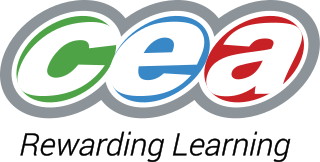Related Research Articles

Citizenship is the status of a person recognized under the law of a country of belonging to thereof. In international law it is membership to a sovereign state.

The General Certificate of Secondary Education (GCSE) is an academic qualification in a particular subject, taken in England, Wales, and Northern Ireland. State schools in Scotland use the Scottish Qualifications Certificate instead. Private schools in Scotland may choose to use an alternative qualification.

The Qualifications and Curriculum Development Agency (QCDA) was a charity, and an executive non-departmental public body (NDPB) of the Department for Education. In England and Northern Ireland, the QCDA maintained and developed the National Curriculum and associated assessments, tests and examinations, advising the minister formerly known as the Secretary of State for Education on these matters.
Education in England is overseen by the United Kingdom's Department for Education. Local government authorities are responsible for implementing policy for public education and state-funded schools at a local level.

Education in Northern Ireland differs from systems used elsewhere in the United Kingdom, although it is relatively similar to Wales. A child's age on 1 July determines the point of entry into the relevant stage of education, unlike England and Wales where it is 1 September. Northern Ireland's results at GCSE and A-Level are consistently top in the UK. At A-Level and BTEC level 3, one third of students in Northern Ireland achieved A and distinction grades in 2007, which is a higher proportion than in England and Wales.

In education, a curriculum is broadly defined as the totality of student experiences that occur in the educational process. The term often refers specifically to a planned sequence of instruction, or to a view of the student's experiences in terms of the educator's or school's instructional goals. In a 2003 study, Reys, Reys, Lapan, Holliday, and Wasman refer to curriculum as a set of learning goals articulated across grades that outline the intended mathematics content and process goals at particular points in time throughout the K–12 school program. Curriculum may incorporate the planned interaction of pupils with instructional content, materials, resources, and processes for evaluating the attainment of educational objectives. Curriculum is split into several categories: the explicit, the implicit, the excluded, and the extracurricular.

The Council for the Curriculum, Examinations & Assessment (CCEA) is a Non-departmental public body (NDPB) of the Department of Education. Its function and purpose is described in Part VIII of the Education (NI) Order 1998.
Personal and Social Education (PSE) is a component of the state school curriculum in Wales. PSE became a statutory requirement in schools in September 2003, and is compulsory for all students at Key Stages 1, 2, 3 and 4, and shares some similar elements with Personal, Social and Health Education and citizenship education in England. These include:
Personal, Social, Health and Economic (PSHE) Education is a school curriculum subject in England that focuses on strengthening the knowledge, skills, and connections to keep children and young people healthy and safe and prepare them for life and work. PSHE education is defined by the schools inspectorate Ofsted as a planned programme to help children and young people develop fully as individuals and as members of families and social and economic communities. Its goal is to equip young people with the knowledge, understanding, attitudes and practical skills to live healthily, safely, productively and responsibly.
Key Stage 3 is the legal term for the three years of schooling in maintained schools in England and Wales normally known as Year 7, Year 8 and Year 9, when pupils are aged between 11 and 14. In Northern Ireland the term also refers to the first three years of secondary education, although these are known as Year 8, Year 9 and Year 10.
Key Stage 4 (KS4) is the legal term for the two years of school education which incorporate GCSEs, and other examinations, in maintained schools in England normally known as Year 10 and Year 11, when pupils are aged between 14 and 15 by August 31st.

Bitesize is the BBC's free online study support resource for school-age pupils in the United Kingdom. It is designed to aid pupils in both schoolwork and, for older pupils, exams.
Key Stage 2 is the legal term for the four years of schooling in maintained schools in England and Wales normally known as Year 3, Year 4, Year 5 and Year 6, when the pupils are aged between 7 and 11 years.
Abbey Community College, known as Monkstown Community School prior to its merger with Newtownabbey Community High School, is a mixed non-denominational secondary school in Newtownabbey, County Antrim, Northern Ireland.
Humanitarian education teaches various social topics from a humanitarian perspective. A desire to reduce suffering, save lives and maintain human dignity is central to understanding humanitarian education. It is based on the assumption that people have an innate desire to help others, so is centrally concerned with our shared humanity.

Erne Integrated College is a co-educational integrated secondary school located in Enniskillen, County Fermanagh, Northern Ireland; it lies within the Western Education and Library Board area.
Additional Mathematics is a qualification in mathematics, commonly taken by students in high-school. It is applied to a range of problems set out in a different format and wider content to the standard Mathematics at the same level.
Citizenship education is taught in schools, as an academic subject similar to politics or sociology. It is known by different names in different countries - for example, ‘citizenship education’ in the UK, ‘civics’ in the US, and ‘education for democratic citizenship’ in parts of Europe. The different names for the subject is mirrored in the different approaches towards citizenship education adopted in different countries. These are often a consequence of the unique historical and political developments within different countries.
Global citizenship education (GCED) is a form of civic learning that involves students' active participation in projects that address global issues of a social, political, economic, or environmental nature. The two main elements of GCE are 'global consciousness'; the moral or ethical aspect of global issues, and 'global competencies', or skills meant to enable learners to participate in changing and developing the world. The promotion of GCE was a response by governments and NGOs to the emergence of supranational institution, regional economic blocs, and the development of information and communications technologies. These have all resulted in the emergence of a more globally oriented and collaborative approach to education. GCE addresses themes such as peace and human rights, intercultural understanding, citizenship education, respect for diversity and tolerance, and inclusiveness.

Science education in England is generally regulated at all levels for assessments that are England's, from 'primary' to 'tertiary' (university). Below university level, science education is the responsibility of three bodies: the Department for Education, Ofqual and the QAA, but at university level, science education is regulated by various professional bodies, and the Bologna Process via the QAA. The QAA also regulates science education for some qualifications that are not university degrees via various qualification boards, but not content for GCSEs, and GCE AS and A levels. Ofqual on the other hand regulates science education for GCSEs and AS/A levels, as well as all other qualifications, except those covered by the QAA, also via qualification boards. The Department for Education prescribes the content for science education for GCSEs and AS/A levels, which is implemented by the qualification boards, who are then regulated by Ofqual. The Department for Education also regulates science education for students aged 16 years and under. The department's policies on science education are implemented by local government authorities on all state schools in England. The content of the nationally organised science curriculum for England is published in the National Curriculum, which covers key stage 1 (KS1), key stage 2 (KS2), key stage 3 (KS3) and key stage 4 (KS4). The four key stages can be grouped a number of ways; how they are grouped significantly affects the way the science curriculum is delivered. In state schools, the four key stages are grouped into KS1–2 and KS3–4; KS1–2 covers primary education while KS3–4 covers secondary education. But in independent or public schools, the key stage grouping is more variable, and rather than using the terms ‘primary’ and 'secondary’, the terms ‘prep’ and ‘senior’ are used instead. Science is a compulsory subject in the National Curriculum of England, Wales and Northern Ireland; state schools have to follow the National Curriculum while independent schools need not follow it. That said, science is compulsory in the Common Entrance Examination for entry into senior schools, so it does feature prominently in the curricula of independent schools. Beyond the National Curriculum and Common Entrance Examination, science is voluntary, but the government of the United Kingdom provides incentives for students to continue studying science subjects. Science is regarded as vital to the economic growth of the United Kingdom (UK). For students aged 16 years and over, there is no compulsory nationally organised science curriculum for all state/publicly funded education providers in England to follow, and individual providers can set their own content, although they often get their science courses accredited or made satisfactory. Universities do not need such approval, but there is a reason for them to seek accreditation regardless. Moreover, UK universities have obligations to the Bologna Process to ensure high standards. Science education in England has undergone significant changes over the centuries; facing challenges over that period, and still facing challenges to this day.
References
- ↑ "Learning for Life and Work |KS3| CCEA". ccea.org.uk. Retrieved 20 June 2021.
- ↑ "Statutory Requirements | KS4" (PDF). ccea.org.uk. Retrieved 20 June 2021.
- 1 2 CCEA http://ccea.org.uk/llw/